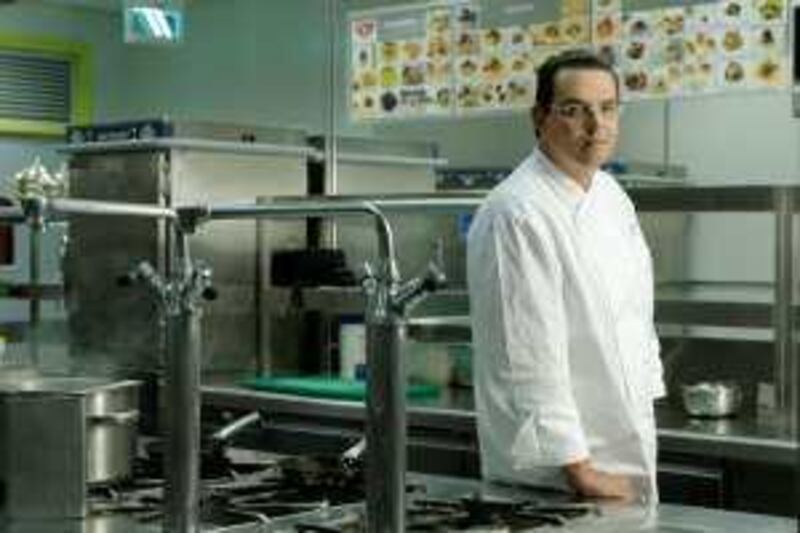"I was supposed to be a police officer like my dad," said Wolfgang Fischer, 45, the executive chef at the Emirates Palace hotel in Abu Dhabi. "But I applied, and they were only accepting so many candidates, and I didn't make it back then." So Mr Fischer, who was raised in Austria, found himself in want of a career. "I saw a TV chef talking about going on journeys and cruise liners like the Queen Elizabeth and I thought 'Yeah, that's what I want to do'," he said. Mr Fischer was accepted into an apprenticeship at the Hilton hotel in Vienna in 1982 and policing's loss became fine dining's gain. The job eventually took him around the globe. He spent most of his career in the US and Asia, before taking the reins three years ago as boss of the Emirates Palace hotel's kitchens. He now manages an army of more than 300 kitchen staff, deployed across 130 kitchens and pantries, including a butchery, patisserie, bakery and three room-service kitchens. He is also responsible for ensuring food is up to standard in each of the hotel's 13 restaurants. Mr Fischer, who wears a crisp white chef's uniform, spends about half his time meeting with staff and managing day-to-day administrative details and the other half in the field. "I do a lot of quality-control checks," he said. "I try to split my time between office and time on the ground." Under his tenure, the hotel has added more fresh food to the menu and hired dozens more staff, but he said his greatest accomplishment has been in the hotel's kitchens, which are now more organised. As for his staff, "I think they are all scared of me, and so they should be." "In a big hotel, if you build a buddy-buddy relationship with staff, it's all over because they won't listen to you anymore," he said. "My door is always open with concerns, but business is business and I made that clear when I arrived." Which is not to say his kitchens are filled with the television stereotype chefs, screaming at their employees and throwing tantrums. "The higher the level of restaurant, the crazier the chef," he said, sighing. "I would not tolerate anybody on my team acting like that, because I'm not like that. I've worked for chefs like that when I was young and I promised myself I would not be like that." His outlook was shaped by his experiences as an apprentice. The early promises of glamour quickly dissipated into a reality of hard work. "What they don't tell you is what a hard job it is to work as a chef. Especially in Europe," he said. No cookbooks. No training manuals. He learnt on the job. "You walk in on your first day and someone first teaches you how to put on your chef's uniform. Then you learn how to respect the equipment: how to use and clean a knife, scrape a cutting board. How to clean a shelf. That's the first one to two months," he said. "Then you move up to the great honour of packing and storing food material. Then you learn how to clean and prepare vegetables and fruits. "A good year goes into the apprenticeship before you actually cook something." It was not a gentle experience. "Back in Europe, the executive chef communicated at the top of his lungs. You learnt all kinds of bad language," he said. "Chefs nowadays lack that discipline; not so much with the cooking, but with the discipline. Especially the Americans. Cowboys." Each year on the job was accompanied by three months at a professional training school that Mr Fischer described as "army-like". Ten men shared each room and beds had to be tucked in with hospital corners every day. After several years of training, the aspiring chef earned the opportunity to participate in an exchange programme in the US. He accepted, boarded a plane and landed in North America. "I arrived on Christmas Day in 1987 in New York without a word of English. It was scary to say the least," he said. "I have never seen cold like that. But I took a bus to Manhattan, rented a hotel room, and they told me to keep coming back." He stayed in the US for seven years. "If you worked in Austria, there are only a handful of city hotels in Vienna and a few resort hotels close to the lakes where you could work," he said. "I always wanted a taste of the big, wide world. Besides, I wanted to see the American dream. I wanted to know what it was all about." He eventually found work at a hotel on the West Coast. He got married and had a son, but later divorced. "Working in the States, you become stagnant. I could have settled down, bought a house and a car and three TVs and lived happily ever after, but that just wasn't me." Mr Fischer decided to move to Asia, where he worked at some of the top hotels in the Eastern hemisphere, including the Raffles Hotel in Singapore and the Wynn Macau. Even so, Mr Fischer found the shift from West to East a revelation. "It was a shock coming from an organised environment into a mess in Asia. In the US, you could have breakfast for 500 people and even if you were not there, it would be perfectly cooked and ready on time. In Asia, you had better be there," he said. "But in Asia, people had a lot more passion about what they were doing." Asian cooks use more fresh ingredients, he said. Even in their approach to western-style cuisine, they were far more refined, making everything from scratch if possible, he said. Eventually, he said, after running the kitchens at the Emirates Palace for another few years at least, he would like to retire to the Pacific Northwest in the US because the climate reminds him so much of Europe. He said he also wants to be closer to his teenage son, who has inspired a new business idea. After seeing the typically soggy fare of wilted chips, heat-lamp pizza and deep-fried mystery meat provided at most high school cafeterias, he said he would like to start a catering service for schools. "It needs improvement, because it's ridiculous," he said. "There are no healthy salads." After more than 20 years on the five-star, intercontinental kitchen circuit, he said he was almost ready to settle down. "I enjoy cooking simple foods," he says. "Forget about all this caviar and edible gold. It's time to do something different." jgerson@thenational.ae
King of the Palace kitchens
The executive chef at the Emirates Palace hotel has spent decades travelling the world and learning from the masters.

Editor's picks
More from the national





